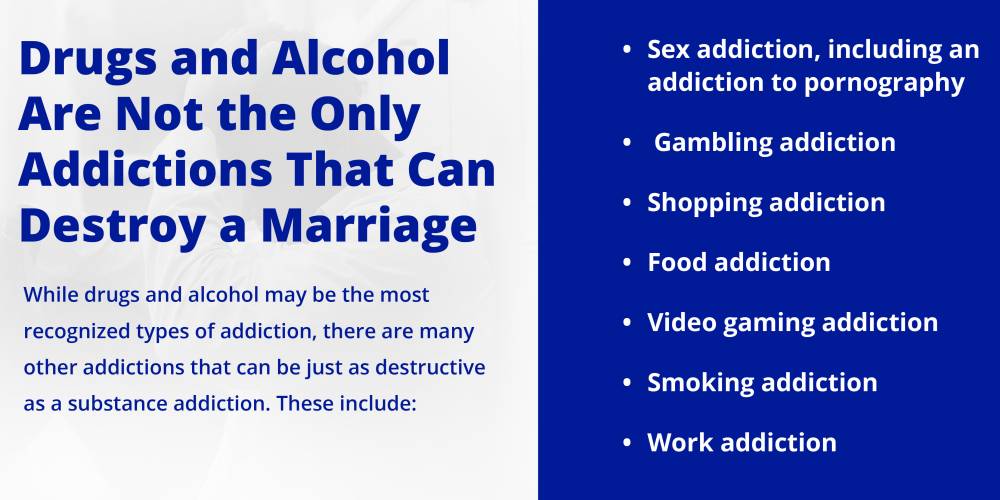Addiction and Divorce: What It Means for You
 One source cited addiction as the third most common reason for divorce among women and the eighth most common reason for men in 2022. At least 3 percent of all marriages end in divorce because of one or both spouses’ substance use disorder. More spouses (6-7 percent) cite substance use as a "motivating factor" for divorce, and six million people across the United States are in a marriage where one spouse is battling addiction.
One source cited addiction as the third most common reason for divorce among women and the eighth most common reason for men in 2022. At least 3 percent of all marriages end in divorce because of one or both spouses’ substance use disorder. More spouses (6-7 percent) cite substance use as a "motivating factor" for divorce, and six million people across the United States are in a marriage where one spouse is battling addiction.
Addiction can put a strain on even the most stable marriage, damaging trust between the spouses and, in some cases, resulting in drug addiction asset dissipation, which can destroy the financial stability of a couple. Drug and alcohol addiction – unlike other issues, which are more likely to be seen as either "right" or "wrong" – is a very gray area. Since more than 63 percent of all adult Americans say they drink alcohol, it can be difficult to judge drinking as wrong.
With marijuana just as legal as alcohol in many states, the question for alcohol and marijuana could be, "How much is too much?" What about prescription drug abuse? Although prescription drugs, marijuana, and alcohol are perfectly legal, the real issue is addiction. Whether you or your spouse is battling addiction, you may wonder how this issue could affect different aspects of your divorce. The best answer to this question can come from an Oswego, IL family law attorney.
Drugs and Alcohol Are Not the Only Addictions That Can Destroy a Marriage
While drugs and alcohol may be the most recognized types of addiction, there are many other addictions that can be just as destructive as a substance addiction. These include:
- Sex addiction, including an addiction to pornography
- Gambling addiction
- Shopping addiction
- Food addiction
- Video gaming addiction
- Smoking addiction
- Work addiction
Anything that is done to excess, creating a strong physical or psychological need to continue doing something or using something, can be considered an addiction. Becoming dependent on a substance or an activity that adversely affects daily life is an addiction.

How Does Addiction Destroy Marriages?
Addiction takes a heavy toll on marriages because an addict’s primary attachment is to his or her drug of choice rather than the spouse. An addict’s need for his or her next "fix" overshadows the needs of the spouse, children, extended family members, and even work. Addiction can destroy a marriage in many ways, often financially. An addict will spend what it takes to get what they want. This is often at the expense of the other spouse’s financial well-being.
The spouses of addicts often become caretakers; when an addict is too sick or too preoccupied with his or her addiction to function normally, the spouse bears the brunt of making a living, caring for the children, and ensuring all household tasks are completed and bills are paid. The overwhelming pressure, along with feelings of resentment and abandonment, can be too much for the spouse of an addict. While some addicts are high-functioning enough to manage a career, many more will have at least some level of dysfunction in the workplace, putting further strain on the marriage.
Perhaps one of the biggest marital issues among spouses where addiction is a problem is the destruction of trust. People in the middle of an addiction are essentially unreliable. Addictions cause people to lie, break their word, and say anything to get what they want. Years of broken promises can break a marriage. Addicts are often unable to manage their emotions, leading to anger. Since addicts are also likely to blame others for their behaviors, these volatile emotional outbursts can be damaging to a marriage.
Even when an addicted spouse seeks help and is in recovery, this, in itself, can push married spouses apart. While the addict may no longer be engaging in destructive behaviors, the other spouse may feel as though the preoccupation with recovery takes just as much of the addict spouse’s time and attention as the addiction. The non-addict spouse may have derived a significant amount of his or her self-worth from being the "fixer" in the relationship – a role that is no longer required.
Will a Family Court Judge Allow One Spouse to Bring Drugs and Alcohol Into the Discussion?
A spouse who intends to go into court and hurl accusations and words like "alcoholic" or "drug addict" while labeling the addicted spouse as "bad" because of the addiction should definitely rethink that strategy. Attempting to assassinate the character of a spouse is unlikely to be looked at kindly by the judge. Addiction is usually only applicable during a divorce if it causes the dissipation of marital assets or if the addiction would cause a child to be in grave danger when in the care of that parent.
How Could an Addiction Affect the Equitable Distribution of Marital Assets?
Illinois operates under the rule of equitable distribution when dividing marital assets. The judge will consider:
- The length of the marriage
- The vocational skills and work experience of each spouse
- The ability of each spouse to support himself or herself
- The age and health of each spouse
- The tax consequences of a proposed property division
- What each spouse contributed to acquiring and preserving marital property
- Any other relevant factors
A judge will also consider whether one spouse significantly dissipated the marital assets, spending money on his or her addiction to the detriment of the non-addicted spouse. If the dissipation of marital assets is clear, the judge may award the other spouse a larger share of the assets to compensate.
Will an Addiction Affect the Allocation of Parental Responsibilities and Parenting Time?
Addiction can potentially affect the allocation of parental responsibilities and parenting time if the judge believes the best interests of the child will be compromised because of a parent’s addiction. Of course, the addiction's type and scope will be considered. If a parent is often drunk and high, even when he or she has the child, then that is not in the best interests of the child. If a parent with a gambling addiction leaves the child home alone to go to the racetrack and place a bet, then that would be a factor in determining parenting time and parental responsibilities.
Contact a Kendall County, IL Divorce Lawyer
If your spouse suffers from an addiction, or if you have an addiction that you fear will impact one or more aspects of your divorce, it is important to speak to a skilled Yorkville, IL divorce attorney from The Law Office of Matthew M. Williams, P.C.. Attorney Williams strives to make the divorce process as simple and amicable as possible. He also has experience with troubled youth and focuses his practice on collaborative divorce and mediation. To schedule an initial attorney meeting, call 630-409-8184.

 630-409-8184
630-409-8184













